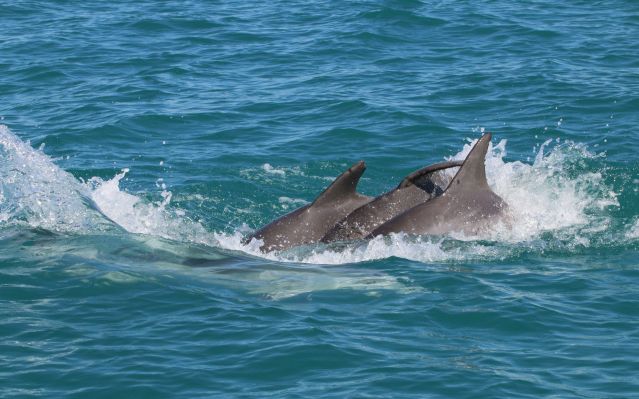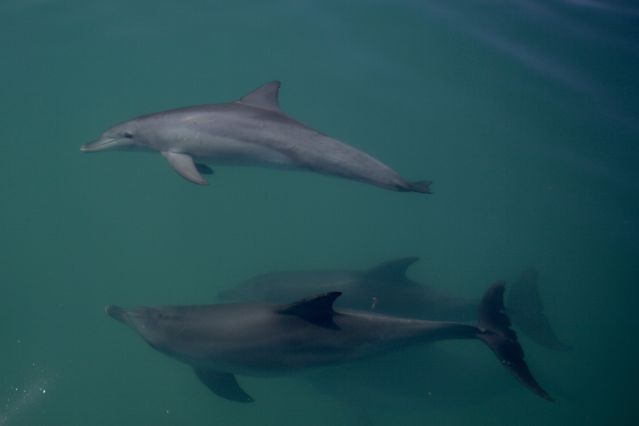Animal Behavior
The Purpose of Play for Young Male Dolphins
Study links juvenile social play and later reproductive success.
Posted June 10, 2024 Reviewed by Lybi Ma
Key points
- Young male dolphins with strong social bonds practice adult-like reproductive behaviors when playing together.
- Males that spend more time practicing adult behaviors during play father more offspring as adults.
- Juvenile social play may function in the development of skills that are crucial for reproductive success.
.JPG.jpg?itok=ioHQeTxX)
Species across the animal kingdom play, suggesting the behavior has benefits. Scientists have long hypothesized a link between juvenile social play and successful adult behavior; however, evidence of such an evolutionary role for play in wild animals is limited.
Now, a new study shows that young male dolphins that practice adult-like reproductive behavior when playing together go on to father more offspring as adults. The findings provide rare evidence that play functions as practice and contributes to reproductive success in the wild.
The Porpoise of Play
“The first thing you will notice about a group of playing dolphins is that there is a lot of white water,” says lead author Kathryn Holmes, now a scientist at the Sarasota Dolphin Research Program. “It’s an energetic behavior, there’s a lot of splashing, and they’re usually doing it at the surface, which is great for us because our research is boat-based.”

Holmes and colleagues collected observations of Indo-Pacific bottlenose dolphins from an ongoing study in Shark Bay, Western Australia, that began in 1982. In this population, unrelated adult males form decades-long alliances in which they repeatedly cooperate to corral and coerce females into mating. Allied males use joint action, where they synchronize and coordinate their behavior, along with threat vocalizations called “pops,” to herd and guard individual females.
Over two decades ago, researchers noticed that juvenile dolphins of both sexes spend a lot of time engaged in social play that resembles adult herding. They take turns, with one individual playing the “it” dolphin (the female role) and the other animals in the group attempting to herd and make contact with them (the male role).
“This resemblance between play and the adult mating behavior led me to wonder whether playing is a way for males to practice these skills and, ultimately, whether this could impact their reproductive success,” says Holmes. “Does playing more make you a more successful adult male?”
Practice Makes Perfect
To investigate, Holmes and colleagues leveraged long-term association and genetic paternity data from the Shark Bay dolphins. The researchers also collected behavioral and acoustic data from juvenile dolphins at play.
They found that juvenile play involves immature versions of adult reproductive behaviors, including herding and producing pop-like sounds. Mastering these behaviors is crucial for adult male dolphins to access and mate with females.
In addition, Holmes and colleagues showed that juvenile males with strong social bonds use social play to practice joint action and that males with stronger bonds are more likely to engage in joint action when play- herding in the adult male roles together.

Finally, the researchers analyzed genetic paternity data from 11 male dolphins. The results showed that adult reproductive success was predicted by the amount of time they spent engaging in male-like behavior during social play as juveniles; that is, juvenile males who spent more time playing (and taking on the male role during social play) fathered more offspring as adults.
Holmes says the study helps us understand one reason why animals play.
“Play looks like such a silly behavior on the face of it,” she says. “It takes a lot of time and energy and can even make you more noticeable to predators. Why would animals do this behavior when they could instead be doing things that will help their immediate survival?
“We are excited about this evidence that practicing adult behavior is one of the functions of play in dolphins and that this has long-term benefits for their reproduction.”
References
Holmes KG, Krützen M, Ridley AR, Allen SJ, Connor RC, Gerber L, Stamm CH, and King SL. 2024. Juvenile social play predicts adult reproductive success in male bottlenose dolphins. The Proceedings of the National Academy of Sciences (121). Doi: 10.1073/pnas.2305948121.


